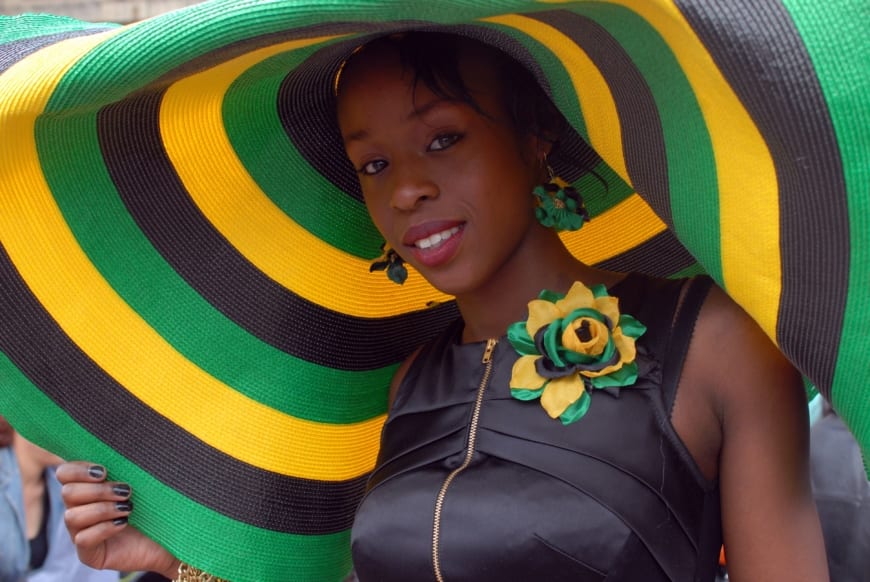The tropical island of Jamaica, also known as the “land of wood and water,” got its name from the Indigenous Taino people who migrated to the island 2,500 years ago. Its unique history and African heritage heavily influence Jamaican culture. Initially inhabited by the Taino Indians from 1,000 BC., through the early 16th century, their culture thrived until the arrival of Spanish settlers. Due to disease, malnutrition, and slavery, the Taino civilization quickly became extinct. Christopher Columbus and Spanish settlers came in search of Gold and other natural resources, and Great Britain subsequently overthrew the Spanish in 1655.
General Facts About Jamaica
Over the preceding centuries, African slaves were brought to Jamaica, which has contributed significantly to the cultural expressions of music, dance, sports, literature, religion, and art. Here are some general facts about Jamaica that may not have known:
– The capital of Jamaica is Kingston
– Jamaica has a population of 2.9 million
– The official currency of Jamaica is the Jamaican Dollar
– The official language spoken in Jamaica is Creole
Jamaican People And Origins

The Indigenous peoples’ of Jamaica global contributions to society. The original inhabitants of Jamaica were the Taino Indians who occupied the island as far back as 1,000 BC. Throughout the island’s history, the Taino were subject to disease, and harsh working conditions and its original descendants have become extinct. Interestingly, the Taino have created several words, which are still used in the English language today. Hammock, tobacco, potato, hurricane, barbecue, cannibal, and canoe. The Taino helped shape Jamaican culture as well as many others. The Jamaican people enjoy a laid back lifestyle. Jamaica is considered one of the happiest places on Earth due to the relaxed attitude of the Jamaican people. The phrase, “No Problem Mon” and “Everything’s Gonna Be Alright,” showcase this relaxed island lifestyle. It’s difficult to pinpoint the exact cause of their carefree lifestyle, yet a tropical climate, smooth beats of reggae, and authentic Jamaican cooking may be the cause. Jamaica is considered one of the most relaxed Caribbean countries.
Jamaican Music And Dance
Bob Marley is considered the Father of Reggae music, click here to see how you can visit his house and see one of the best known cultural contributions to Jamaica and reggae music. Reggae music originated in the early 1960s. Mento music predates Reggae and has helped influence its musical rhythms. This musical genre makes use of acoustical instruments, such as the guitar, banjo, and hand drums. There are several styles of reggae today, which include roots reggae, dub, and reggaeton. Reggae is one of the most Internationally recognized musical genres. Jamaican dances are derived from European and African influences. A majority of the dances in Jamaica are centered around religious celebrations. One famous dance in the Jonkunnu, which is typically performed around Christmas time. The Tambu dance is performed primarily for entertainment with a couple facing and moving towards each other. The Gumbay is a type of ritualistic healing dance similar to Myal with extravagant body movements. Jamaica has a wide variety of dances, some popular, and some obscure.
Facts About Jamaican Festivals

Jamaica hosts vibrant, exciting festivals throughout the year. Some of the most popular festivals celebrated in Jamaica are Carnival and Reggae Sumfest. Carnival is typically observed in March before Easter and features music, dance, food, drinking, parties, and overall a fun party atmosphere. Reggae Sumfest is the largest music festival in Jamaica and the Caribbean.
Sumfest is held every year in July in Montego Bay. Reggae’s popularity brings thousands of people to Jamaica each year.
Celebrating Jamaican history at the annual Maroon festival.
During the 16th and 17th century African slaves brought to Jamaica that escaped took refuge in the mountainous interior and isolated themselves. The term “Marooned” found its roots here. During the mid 19th century, slavery in Jamaica was abolished. Many of the African descendants that were marooned returned to the coastal regions. The maroon festival celebrates the peace treaty signed by the marooned slaves and British. The maroon festival showcases Jamaican history and culture.
Jamaican Sports

Jamaica’s popular sports originated in Britain. Sport is a significant feature of Jamaican culture. Some of the most popular sports are cricket, basketball, football, track and field, boxing, and cycling, to name a few. Jamaican sports go beyond warm climate sports, despite being a tropical island, Jamaica has a bobsled team, as well as a ski team. Jamaica is also home to the fastest sprinter in the world, Usain Bolt. School children in Jamaica are actively involved with sports at an early age.
Jamaica is famous for its track and field athletes. Well known Jamaican sprinters Usain Bolt and Veronica Campbell helped revitalize sports enthusiasm throughout the island. In 2011, Veronica Campbell won gold in the 200 meter World Championships in Athletics. Usain Bolt is famous for having set three world records in a single Olympic game. Usain Bolt is considered the fastest man alive and ran the 100 meters in 9.63 seconds in 2012. Jamaican athletes have collectively won 78 Olympic medals.
Jamaican Culture
The most well-known aspects of Jamaica’s culture are reflected in its various sports and music, followed by its authentic cuisine, and various belief systems. Jamaica has a long, rich history that’s brought to life through its multiple festivals held throughout the year. Jamaica’s cultural contributions to the world have taken this small tropical island nation too places as far away as Alberta, Canada.




